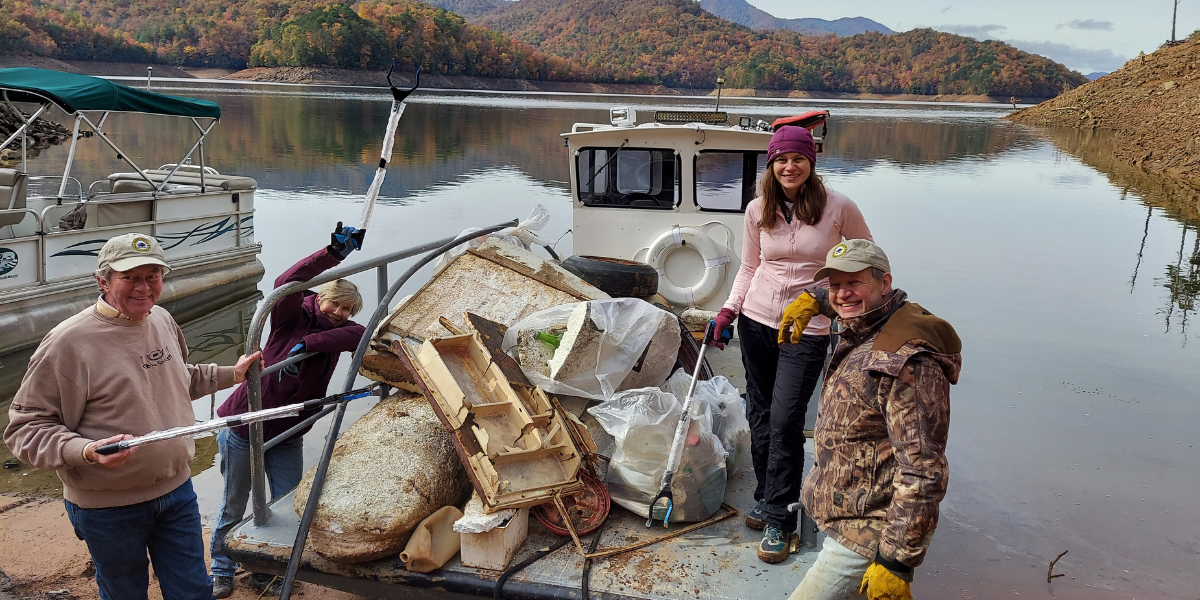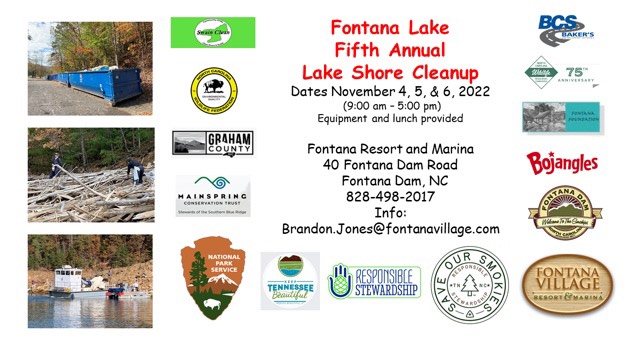Volunteers Needed for Fontana Lake Cleanup, Nov. 4-6

North Carolina conservation organizations need 150 volunteers from Nov. 4-6 to remove litter from Fontana Lake for the country’s largest trash cleanup effort in a national park.
The event will be held over three days at the Fontana Resort and Marina. Volunteers can sign up for shifts anytime between 9 a.m. and 5 p.m. The 5th Annual Fontana Lake Shore Cleanup will involve at least 10 pontoon boats and six large dumpsters to transport and remove the trash. This year’s goal is to remove 50,000 pounds of litter with support from at least 150 volunteers who can commit to at least half a day out on Fontana Lake’s islands cleaning up debris. (Watch Keeping Afloat with the Joneses video: Come Hang Out with Use on Lake Fontana Nov. 2022 and make the world a better place)
Spanning 10,230 acres and reaching depths of 400 feet, the artificial finger lake is home to one of the most diverse fisheries in the country. Fontana Lake’s 238 miles of shoreline provide a natural landscape and unique habitats for wildlife such as black bears, bobcats, foxes, bald and golden eagles, ospreys, otters, turkeys and deer. Visitors enjoy experiencing Fontana Lake’s natural beauty, rich cultural heritage and abundant outdoor opportunities. Boaters and anglers come for the spectacular fishing while campers and hikers explore the wilderness or Appalachian Trail footpath that crosses the lake’s dam.
 “Unfortunately, Fontana Lake is also a gathering place for garbage that’s dumped – both accidentally and knowingly – or collected from other water networks that carry the trash downstream,” said Tara Moore, North Carolina Wildlife Federation’s director of conservation partnerships.
“Unfortunately, Fontana Lake is also a gathering place for garbage that’s dumped – both accidentally and knowingly – or collected from other water networks that carry the trash downstream,” said Tara Moore, North Carolina Wildlife Federation’s director of conservation partnerships.
Left in the lake, the litter leaches deadly toxins into the environment, reducing the quality of Fontana Lake and the Little Tennessee River. Aquatic and terrestrial wildlife also suffer when they ingest or get caught in the litter.
“What’s great about the Fontana Lake event and our other habitat restoration projects is that the benefits are immediate and long-lasting,” Moore said. “We’re removing toxins from the environment, restoring visual aesthetics and maintaining the area’s cultural heritage, so it continues to be a beautiful natural resource for wildlife and outdoor enthusiasts to enjoy and explore. And our wildlife will thank us for keeping them safe.”
Since 2019, staff and volunteers from the North Carolina Wildlife Federation, Fontana Village Resort and Marina, Mainspring Conservation Trust, Tennessee Valley Authority, National Park Service and Smoky Mountain Hiking Club have removed more than 170,000 pounds of litter from Fontana Lake through volunteer cleanup efforts.
“We’ve collected all sorts of garbage – massive chunks of styrofoam, pieces of glass, rotted car tires and hundreds of bottles and other single-use plastics,” Moore said. “By eliminating trash from Fontana Lake’s waters, islands and shoreline, we have cleaner water feeding the Little Tennessee River, improved wildlife habitat and more inviting natural areas for everyone to enjoy.”
In addition to being the country’s largest trash cleanup effort in a national park, the event is NCWF’s most significant collaborative habitat restoration effort. For every 25 pounds of trash collected at the lake and dam, the organization will plant a native tree, shrub or 10 pollinator plants to promote healthy wildlife habitat.
Most Fontana Lake volunteers come from Swain and Graham counties, but any conservation-minded individuals are welcome to help. Financial support from the Appalachian Trail Conservancy and Bill Staton, in honor of Novare Capital Management, made it possible to appropriately dispose of the litter and recycle discarded tires from last year’s cleanup.
Sign up to volunteer for Fontana Lake cleanup
For questions, contact Tara Moore at 704-332-5696 or [email protected].
Clean & Green
For decades, North Carolina Wildlife Federation has been restoring habitat for wildlife species across the state. Often habitat restoration starts by removing unsightly, harmful litter from the ground and waterways. Unfortunately, plastic and other materials are often mistaken as food and ingested by wildlife resulting in starvation, entanglement or strangulation. Some 180 marine species have been documented to ingest litter after mistaking it for food. Around 80 percent of marine litter enters the ocean via sewers, storm drains and other inland sources. North Carolina’s habitat degradation problem isn’t going away anytime soon without a collective, statewide effort to remove litter and improve habitat through native pollinator plants, shrubs and trees.
In committing to making North Carolina Clean & Green, NCWF and its chapters and partners organize cleanups and native plantings to restore these habitats and provide food, water, shelter and places to raise young for all of our native wildlife. Priority areas for plantings include riparian habitats and habitats in under-resourced communities. Several chapters have adopted streams, trails and highways to combat the litter issue and promote habitat restoration.
Join or Host a Cleanup Event
Every cleanup effort is regarded as valuable and counts towards reaching our statewide campaign to Keep it Clean, Make it Green. You can join the statewide movement by volunteering to clean up litter or plant trees, shrubs and pollinator plants in your community. Find out about more upcoming cleanups here. You also can organize your own neighborhood cleanup or head outside for a solo trash-collecting outing. Download our Habitat Restoration Volunteer Toolkit and read this blog for inspiration and tips on getting started. Be sure to report your results to us to add your efforts to our annual cleanup goal and plant more trees and pollinator plants.
